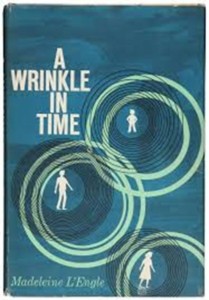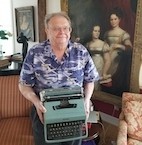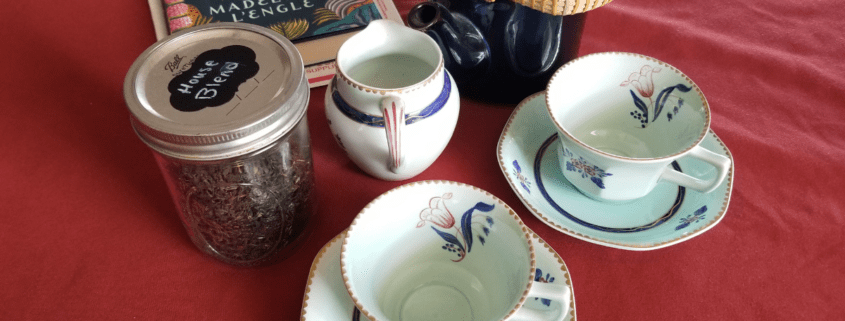A Next Door Neighbor Remembers the Franklins #5
“With the Compliments of the Publisher”
An author’s perk with each new book is a box of them arriving on the doorstep “with the compliments of the publisher.” I still remember the thrill opening my ten copies of Hudson River Catastrophes, Contests and Collisions thirteen years ago.
In the Franklin’s kitchen one afternoon in summer 1962, my mother was arranging Grandma Camp’s hair before helping her dress for dinner.
“UPS coming, Tom,” summoned my mother. I went through the garage hearing Vivaldi’s violins with Madeleine’s clattering typewriter keeping time from behind the Tower door. “This is a very heavy box of books, son,” said the driver “Let me carry them in for you.”
Madeleine was already in the kitchen to sign for them having seen the truck from her window.
“Mother, Clara, Tom, we are in need of tea!” she declared.
“None of your mice in a mug, Daughter” was her mother’s reply. “I want a proper pot and cup.” She disdained those heavy, large individual mugs with the brown soggy teabag sitting in the bottom, its accompanying string and label hanging over the side. This was more of their banter, like Mrs. Camp referring to her as “Daughter” every time she was called “Mother.”
Madeleine put a battered teakettle that no longer whistled on the glowing coils. A milk pitcher and sugar bowl were set on a tray beside rounds of “Walkers Shortbread” shoved from their sleeve to lay at attention on a plate. In true English fashion, she tipped a little boiling water into the pot, swirled it three times before dumping in the sink. Two teabags torn open had their contents shaken in ahead of the merrily boiling water. Three cups and saucers from the dishwasher completed the ceremony.
I smiled. In our house, my mom also heated the pot, put in two Red Rose teabags and let it steep four minutes before filling china cups, each with its matching saucer. Madeleine wanted her mother to have the full experience with tea leaves in the bottom of her cup as it had always been done in her mother’s day
Tea brewing, we attacked the box of books. The tape’s thick nylon threads rendered the paring knife useless. A drawer revealed amid a bevy of wine corks a miniature hacksaw. Giving it to me, she proceeded pour the tea and hand them each a cup with their choice of milk and sugar which she added. Then she offered them the sweet crumbly butter cookies
The saw successful, she folded back the flaps, leaned over the box and took a deep breath, “That’s the smell of hard work.”
A Wrinkle in Time had not found ready acceptance. The cream of New York’s publishing houses rejected it citing among other reasons “children having to confront evil,” “phantasmagorical characters,” “time travel.” All questioned its suitability for children’s bookshelves.
 Farrar, Straus and Giroux children’s book press, Ariel, took a chance. Sixty years later, there have been 16 million copies in 40 languages. It has been made a movie twice and a graphic novel. In May 2022, I am to enjoy it as a theatrical production by the Goshen Players in the Old Town Hall. But we were not to know any of this.
Farrar, Straus and Giroux children’s book press, Ariel, took a chance. Sixty years later, there have been 16 million copies in 40 languages. It has been made a movie twice and a graphic novel. In May 2022, I am to enjoy it as a theatrical production by the Goshen Players in the Old Town Hall. But we were not to know any of this.
It looked as disturbing then as it does 59 years later.
Madeleine pried out a copy, took it to the kitchen island and rattled through a heavy glass of pens to find the one she wanted. Its spine creaked as she opened, thought a moment, wrote at length, closed and handed it to me. Inside, in a heavy felt tip she wrote:
To Thomas Allison:
Words are written in colour not black and white,
Your neighbour,
Madeleine L’Engle
“Thank you, Madeleine. This is my first autographed book.”
“I expect it won’t be your last, Tom”
Contemplating what it meant, my reverie was broken by Grandma Camp’s impatient voice from the window corner, “Well, Tom what did she write?”
In my bookcase, it had pride of place. By college, the collection of a young teenager’s Hardy Boys mysteries, Weekly Reader young people’s novels, and my first history books were dismissed to the attic. In their place were more adult choices. When a fire in the town library two decades later initiated a call for books, my mother donated all my juvenile volumes.
Only in the 1990’s did I find them gone. In a sale of discards, the library offered a copy of Wrinkle, but it was not mine. In 2008, a first edition of the 41st Newberry Medal winner sold at a PBA Galleries’ auction for $10,800. Most of Madeleine’s dedications say “Tesser well” or something else from the book. We shall never know how much a very personal complimentary copy could bring on the auction block .
In September 2021, Ebay offered me a late printing of a first edition in good condition with dust jacket bearing a Gold Newberry Award sticker for the modest price of $24.50. Unwrapping it, I knew it was not mine, but I still experienced a tesser back to that Connecticut kitchen.
 Tom Allison is a retired Congregational Minister living in Albany NY. Rehabbing a house once owned by a Hudson River Steamboat Captain inspired his looking into that history culminating in Hudson River Steamboat Catastrophes Contests and Collisions (History Press 2013) available Barnes and Noble and Amazon. Since 5th grade he has enjoyed offering to the public illustrated history lectures. Among the 40 plus have been American Cookbooks, plumbing,, transatlantic steamboat travel in the golden age, Litchfield Connecticut: America’s most historic mile and A neighbor remembers Madeleine L’Engle, (for the 100th anniversary of her birth) to name a few. He is pictured here at Crosswicks, with the typewriter Madeleine gave him on the occasion of his high school graduation.
Tom Allison is a retired Congregational Minister living in Albany NY. Rehabbing a house once owned by a Hudson River Steamboat Captain inspired his looking into that history culminating in Hudson River Steamboat Catastrophes Contests and Collisions (History Press 2013) available Barnes and Noble and Amazon. Since 5th grade he has enjoyed offering to the public illustrated history lectures. Among the 40 plus have been American Cookbooks, plumbing,, transatlantic steamboat travel in the golden age, Litchfield Connecticut: America’s most historic mile and A neighbor remembers Madeleine L’Engle, (for the 100th anniversary of her birth) to name a few. He is pictured here at Crosswicks, with the typewriter Madeleine gave him on the occasion of his high school graduation.



